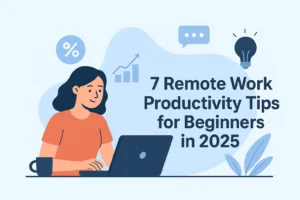Introduction
In today’s fast-changing world, technology is no longer just a tool—it’s the backbone of success. From artificial intelligence to remote collaboration tools, innovations are shaping how we work, learn, and live. Those who adapt thrive, while those who resist risk being left behind. Whether you’re an entrepreneur, freelancer, or part of a growing company, adapting to tech is the key to staying in the winning circle. Let’s explore why, and how you can start making smart changes in 2025.

1. The Rapid Pace of Technological Change
We’ve entered an era where technology evolves faster than ever. Artificial intelligence, automation, blockchain, cloud computing, and virtual collaboration are no longer futuristic—they’re here.
- AI tools like ChatGPT and MidJourney streamline tasks.
- Automation improves efficiency in industries like manufacturing and marketing.
- Remote work platforms allow businesses to operate globally without physical offices.
The reality is simple: adapt or risk obsolescence.
2. Why Individuals Need to Adapt
For individuals, adapting to technology isn’t optional anymore—it’s survival. Digital literacy is as critical today as reading and writing were in the past.
- Upskilling matters: Learning new tools boosts career opportunities.
- Freelancers benefit: By mastering AI tools, freelancers can save hours of manual work.
- Professionals stay relevant: Those who embrace learning are less likely to be replaced.
Example: A digital marketer who refuses to use AI-driven analytics will struggle, while one who adapts will provide deeper insights and stay competitive.
3. Why Businesses Must Embrace Technology
Companies that embrace technology lead industries, while laggards lose ground. Digital transformation is no longer a “future plan”—it’s a must.
- Customer expectations: Shoppers now demand apps, chatbots, and instant digital services.
- Efficiency boost: Cloud solutions cut costs while improving scalability.
- Competitive edge: Brands that innovate attract loyal customers.
Case in point:
- Netflix thrived by adapting streaming tech.
- Blockbuster resisted change—and collapsed.
4. Adapting Creates New Opportunities
When you embrace new tools, you don’t just keep up—you discover opportunities others miss.
- Entrepreneurs find gaps in emerging tech markets.
- Professionals can build side hustles online.
- Startups can disrupt industries with digital-first solutions.
Technology isn’t just about surviving—it’s about creating new ways to win.
5. Challenges of Tech Adoption
Adapting isn’t always easy. Businesses and individuals face challenges such as:
- Resistance to change (comfort in old ways).
- Learning curves with new tools.
- Cost concerns, especially for small businesses.
But these challenges are temporary. The long-term payoff—efficiency, growth, and relevance—makes adaptation worth it.
6. Practical Ways to Adapt to Tech in 2025
Here are some easy, actionable steps:
- Upskill regularly – Take online courses (Coursera, Udemy, LinkedIn Learning).
- Experiment with AI tools – Try free AI software for content, design, or analytics.
- Use automation – Automate repetitive tasks like email sorting or project tracking.
- Stay updated – Follow tech blogs like The Digital Hunts for trends and tutorials.
- Network digitally – Join online communities to exchange knowledge.
Conclusion
Adapting to technology isn’t about chasing every shiny new tool—it’s about making smart, strategic changes to stay relevant, competitive, and future-ready.
In 2025, the winning circle won’t be defined by who works the hardest, but by who adapts the fastest. Embrace the shift, and success will follow.
FAQs
Q1: Why is adapting to technology important in 2025?
Because industries are evolving at lightning speed, and those who adapt stay competitive while others fall behind.
Q2: How can businesses adapt quickly to new technologies?
Start small—implement automation, train staff, and adopt customer-friendly digital solutions.
Q3: What happens if I resist technological change?
You risk becoming less efficient, losing opportunities, and eventually being outpaced by competitors.
Q4: Is adapting to technology expensive?
Not always. Many affordable or free tools (like Trello, Notion, and AI assistants) can create big impacts.
Q5: How can individuals start adapting today?
Pick one tool or skill (like AI writing, project management, or coding) and learn it this month—consistency wins.
















 The Digital Hunts – Global Guest Post Site
The Digital Hunts – Global Guest Post Site Contact Us:
Contact Us: